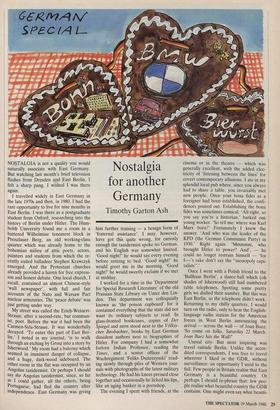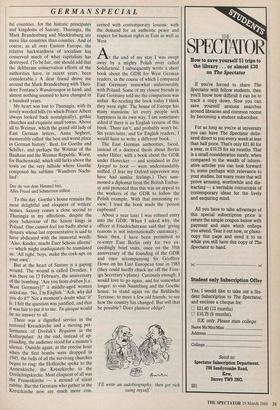Nostalgia for another Germany
Timothy Garton Ash
NOSTALGIA is not a quality you would naturally associate with East Germany. But watching last month's brief television flashes from Dresden and East Berlin, I felt a sharp pang. I wished I was there again.
I travelled widely in East Germany in the late 1970s and then, in 1980, I had the rare opportunity to live for nine months in East Berlin. I was there as a postgraduate student from Oxford, researching into the history of Berlin under Hitler. The Hum- boldt University found me a room in a battered Wilhelmine tenement block in Prenzlauer Berg, an old working-class quarter which was already home to the bohemian milieu of attic poets, actors, painters and students from which the re- cently exiled balladeer Stephen Krawczyk emerged. And the Protestant churches already provided a haven for free express- ion and honest debate. One local church, I recall, contained an almost Chinese-style `wall newspaper', with full and fair accounts of the Nato and Warsaw Pact nuclear armouries. The 'peace debate' was just getting under way.
My street was called the Erich-Weinert- Strasse, after a second-rate, but commun- ist, poet. Before the war it had been the Carmen-Syla-Strasse. It was wonderfully decayed. 'To enter this part of East Ber- lin,' I noted in my journal, 'is to walk through an etching by Grosz into a story by Isherwood.' My room had a balcony which seemed in imminent danger of collapse, and a huge, dark-wood sideboard. The other room in the flat was occupied by an Angolan taxidermist. Or perhaps I should say the Angolan taxidermist, since, so far as I could gather, all the others, being Portuguese, had fled the country after independence. East Germany was giving him further training — a benign form of `fraternal assistance'. I may, however, have got this quite wrong, for curiosly enough the taxidermist spoke no German, and his English was somewhat limited. `Good night!' he would say every evening before retiring to bed. 'Good night!' he would greet me in the morning. 'Good night!' he would sweetly exclaim if we met at midday. I worked for a time in the 'Department for Special Research Literature' of the old Prussian State Library on Unter den Lin- den. This department was colloquially known as 'the poison cupboard' for it contained everything that the state did not want its ordinary subjects to read. In glass-fronted bookcases, copies of Der Spiegel and stern stood next to the VOlkis- cher Beobachter, books by East German dissident authors next to biographies of Hitler. For company I had a somewhat forlorn Indian Professor, reading the Times, and a senior officer of the Wachregiment Teliks Dszierzynski' read- ing slowly through piles of Western jour- nals with photographs of the latest military technology. He had his knees pressed close together and occasionally he licked his lips, like an aging banker in a pornshop.
The evening I spent with friends, at the cinema or in the theatre — which was generally excellent, with the added elec- tricity of 'listening between the lines' for covert contemporary allusions. I ate in my splendid local pub where, since you always had to share a table, you invariably met new people. Once your bona fides as a foreigner had been established, the confi- dences poured out. Establishing the bona fides was sometimes comical. 'All right, so you say you're a historian,' barked one young worker. 'So tell me: where was Karl Marx born?' Fortunately I knew the answer. 'And who was the leader of the KPD (the German Communist Party) in 1930.' Right again. `Mmmmm, who brought Hitler to power? And', — he could no longer restrain himself — 'for f----'s sake don't say the "monopoly capi- talists".'
Once I went with a Polish friend to the `Ballhaus Berlin', a dance-hall which (oh shades of Isherwood) still had numbered table telephones. Spotting some pretty girls we dialled their number. But this was East Berlin, so the telephone didn't work. Returning to my chilly quarters, I would turn on the radio, only to hear the English- language radio station for the American forces in West Berlin announcing the arrival — across the wall — of Joan Baez: `So come on folks. Saturday 22 March. Joan Baez hits the Wall!'
Unreal city. But most inspiring was travel outside Berlin. Unlike the accre- dited correspondents, I was free to travel wherever I liked in the GDR, without surveillance: an opportunity I used to the full. Few people in Britain realise that East Germany is a beautiful country. Or perhaps I should re-phrase that: few peo- ple realise what beautiful country the GDR contains. One might even say what beauti-
GERMAN SPECIAL
ful countries, for the historic principates and kingdoms of Saxony, Thuringia, the Mark Brandenburg and Mecklenburg are more like countries than counties. And of course, as all over Eastern Europe, the relative backwardness of socialism has conserved much of what capitalism has destroyed. (To be fair, one should add that the deliberate conservation efforts of the authorities have, in recent years, been considerable.) A dear friend drove me around the Mark Brandenburg with Theo- dore Fontane's Wanderungen in hand, and almost nothing seemed to have changed in a hundred years.
My heart was lost to Thuringia, with its lovely wooded hills (to which Prince Albert always looked back nostalgically), gothic churches and exquisite small towns. Above all to Weimar, which the grand old lady of East German letters, Anna Seghers, memorably called 'the best and worst place in German history'. Best, for Goethe and Schiller, and perhaps the Weimar of the Bauhaus and the Weimar Republic. Worst, for Buchenwald, which still lurks above the town on the very hillside where Goethe composed his sublime `Wandrers Nacht- lied': Der du von dem Himmel bist, Alles Freud and Schmerzen stillest. . . .
To this day, Goethe's house remains the most delightful and eloquent of writers' homes. Saxony comes a close second to Thuringia in my affections, despite the poor behaviour of the Saxon kings in Poland. One cannot feel too badly about a dynasty whose last representative is said to have abdicated with the immortal words: `Also, Kinder, macht Euer Scheiss alleene' — which might inadequately be translated as: 'All right, boys, make the cock-ups on your own'.
But at the heart of Saxony is a gaping wound. The wound is called Dresden. I was there on 13 February, the anniversary of the bombing. 'Are you from driiben [i.e. West Germany]?' a middle-aged woman asked me. 'No, I'm English."Ach, why did you do it?' Not a moment's doubt what 'it' is. I felt the question was justified, and that it was fair to put it to me. Tu quo que would be no answer to all.
There was a dignified service in the restored Kreuzkirche and a moving per- formance of Dvofak's Requiem in the Kulturpalast. At the end, instead of ap- plauding, the audience stood for a minute's silence. Outside again, at the precise hour when the first bombs were dropped in 1945, the bells of all the surviving churches began to ring: the Hofkirche spoke to the Annenkirche, the Kreuzkirche to the DreikOnigskirche. Most eloquent of all was the Frauenkirche — a mound of silent rubble. But the Germans who gather in the Kreuzkirche now are much more con- cerned with contemporary lessons: with the demand for an authentic peace and respect for human rights in East as well as West.
At the end of my stay I was swept away by a mighty Polish river called Solidarnok. I subsequently wrote a short book about the GDR for West German readers, in the course of which I compared East Germany somewhat unfavourably with Poland. Some of my closest friends in East Germany told me the comparison was unfair. Re-reading the book today I think they were right. The house of Europe has many mansions: let every people seek happiness in its own way. I am sometimes asked if there is an English version of this book. There isn't, and probably won't be. Six years later, and for English readers, I would have to write a different book.
The East German authorities, faced, instead of a doctoral thesis about Berlin under Hitler, with a book about the GDR under Honecker — and serialised in Der Spiegel to boot — were understandably miffed. (I fear my Oxford supervisor may have had similar feelings.) They sum- moned a diplomat from the British Embas- sy and protested that this was an appeal to the workers of the GDR to follow the Polish example. With that interesting re- view, I trust the book made the 'poison cupboard'.
About a year later I was refused entry into the GDR. When I asked why, the officer at Friedrichstrasse said that 'giving reasons is not internationally customary.' Since then, I have been permitted to re-enter East Berlin only for two ex- ceedingly brief visits, once on the 35th anniversary of the founding of the GDR and once accompanying Sir Geoffrey Howe on his East European tour in 1985 (they could hardly chuck me off the Fore- ign Secretary's plane). Curiously enough, I would love to go again, and for somewhat longer: to visit Naumburg and the Goethe house, to stand again on the Briihlsche Terrasse; to meet a few old friends; to see how the country has changed. But will that be possible? Does glasnost oblige?
write an autobiography, then get rich suing myself.'

























































 Previous page
Previous page